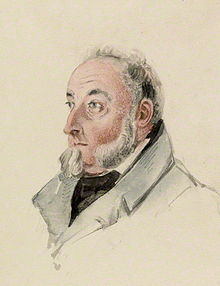Willoughby Cotton
| Sir Willoughby Cotton | |
|---|---|

Sir Willoughby Cotton, by James Atkinson
|
|
| Born | 1783 |
| Died | 4 May 1860 (aged 77) |
| Allegiance |
|
| Service/branch | British Army |
| Years of service | 1798–1854 |
| Rank | Lieutenant General |
| Commands held | The forces in Jamaica (1829–1834) Western District (1835–1840) Bombay Army (1847–1850) |
| Battles/wars |
Peninsular War, Waterloo Campaign, First Anglo–Burmese War, Great Jamaican Slave Revolt, First Anglo-Afghan War |
| Awards |
Knight Commander, Hanover Order Knight Grand Cross of the Order of the Bath Military General Service Medal with 3 Clasps (Burgos, Vittoria, Nive) Army of India Medal with AVA clasp Ghuznee Medal Mentioned in Despatches Order of the Dooranee Empire |
Lieutenant General Sir Willoughby Cotton GCB KCH (1783–1860) was a British soldier.
Willoughby Cotton was born in 1783, to Admiral Rowland Cotton and Elizabeth Aston. They also had a daughter, Sydney Arabella Cotton. Rowland Cotton was from a well-established Chester family, while Elizabeth was the only daughter of Sir Willoughby Aston, 5th Baronet Aston, of Aston, Chester.
Cotton married Lady Augusta Maria Coventry on 16 May 1806 in Marylebone, London. They had three children together, Augusta Mary Cotton, Willoughby Cotton and Maj.-Gen. Corbet Cotton.
Willoughby Cotton entered Rugby School at the age of 12 in 1795. Cotton, aged 14, was a ringleader in the “Great Rebellion” of November 1797. Aggrieved by the attitude of the Head Master, Dr. Henry Ingles (1794–1806), following the breaking of a window, students blew his classroom door off with gunpowder and followed this by burning desks and books upon the close, before retreating to the Island (a Bronze Age burial mound surrounded by a moat). Ingles called in the local militia, whereupon the Riot Act was read and the Island taken. Soldiers stole round to the rear, and wading across the moat, drawn sword in hand, took the whole party prisoner. Cotton was among the students to be expelled as a result of this confrontation.
Cotton entered the Third Guards (renamed the Scots Guards in 1831) as an Ensign in the First Battalion, on 31 October 1798. He quickly gained his Lieutenancy, on 25 November 1799 and took part in Lord Cathcart's Hanover Expedition in 1805. The 1st Battalion and Cotton were also involved in the 1807 Copenhagen Expedition, again commanded by Lord Cathcart. Cotton was appointed Adjutant-General to the reserve under the Command of Arthur Wellesley (soon to become the Duke of Wellington) and was involved in the Battle of Køge on 29 August 1807.
...
Wikipedia
